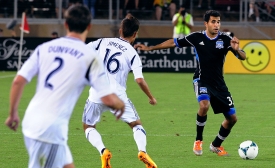iran
As talks between Iran and six major powers on limiting its nuclear program enter the final stages of diplomacy this week in Vienna ahead of a July 20 deadline, global companies are fact-finding, meeting with potential Iranian partners and jockeying for position should an end to sanctions open the isolated economy.
Both Iranian and American football fans were brought to their knees through tragic goals in injury time in Brazil last week, perhaps a cruel reminder that sport is intrinsically apolitical. While the teams temporarily provided company for the other’s misery, it serves as a reminder of how sport has helped bring the United States and Iran together, and in some instances, made them the “strongest allies”.
Iran is ready to help Iraq fight an armed revolt using the same methods it deployed against opposition forces in Syria, an Iranian general said, suggesting Tehran is offering to take a larger role in battling Sunni militias threatening Baghdad.

Taking a closer look at the opportunities created by the World Cup this year, in Brazil and elsewhere.
Numerous reports indicate that Iranian authorities restrict access to thousands of American and European websites, particularly those of international news sources, and even throttle down Internet connections to limit the ability of Iranians to surf the rest of the Web. Here at the Voice of America Persian Service, we are familiar with this situation firsthand.
Steven Beitashour had only ever been to Iran twice as a child when he boarded a plane to Tehran as a 26-year-old to play soccer. Last October, he formally joined the Iranian national soccer team in preparation for the country's fourth appearance on soccer's largest stage.

The complex allegiances of Steven Beitashour, the Iranian team's American player.
A far more compelling contest between Ghana and Germany will shortly demand your attention. But just for an instant, you were a witness to someone else’s history. You wanted them to do well. That’s the most potent form of diplomacy.







